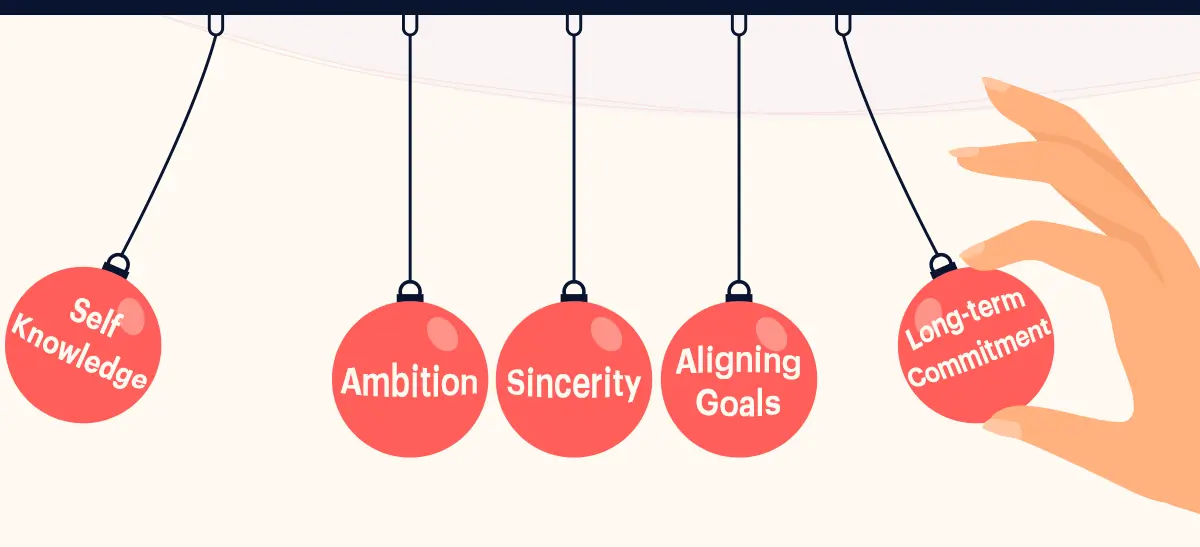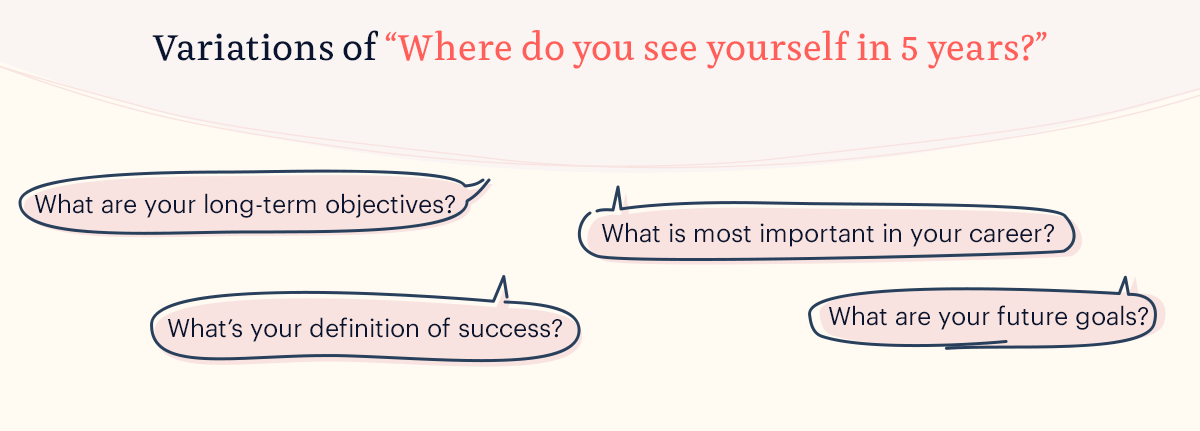“Where do you see yourself in 5 years?” is a much hated question at job interviews. And I’m not surprised.
It can be hard to articulate your future goals when you don’t even know what you’ll have for dinner tomorrow.
But don’t worry. The interviewers don’t expect you to tell them exactly where you’ll be in five year’s time. They only want to hear about your motivations and career goals and see if they match with theirs.
Something relatively general like “I see myself in a position where I have progressed up the career ladder, feel fulfilled, and am making a meaningful contribution to the company” usually does the trick.
But if you want to make sure you have prepared a good answer for all kinds of different interview situations or specifically for your position, keep on reading!
What do employers look for in your answer?
This seemingly simple question is actually loaded. Your answer will provide the hiring manager with the information (good or bad) he needs to decide if you’re the right person for the job.
Hence, why it’s so important to truly understand this question.
Why do they ask?
In short, when asked “Where do you see yourself in years?” your hiring manager wants to know if you’re someone who can commit long-term to the company. It's asked to weed out those who can’t, which lowers their company’s turnover rate. That in turn saves them time and money that would be spent in retraining.

What do they want to know?
Your interviewer is able to know if you're capable of long-term commitment once he evaluates several layers of your answer. He wants to know if:
- You’re someone with self-knowledge: If you have dedicated the time to know who you are, chances are you know what you want. Such a quality can be very valuable to the company because you won’t just up and leave one day because you suddenly found a new calling.
- You’re ambitious: Hiring managers look for individuals with this trait because they’re usually enthusiastic and driven, constantly reaching for the next goal.
- You sincerely want the job: Having passion for the tasks that come with the job increases the probability that the job you're applying for will fulfil your needs. This will also increase your productivity as it’s easier to get in a state of flow when doing something you enjoy.
- Your goals align with the company’s goals: Aligning goals gets you and the company pushing in the same direction. This benefits both sides as you will feel you’re doing something meaningful, which means you will work with intention and thus provide better work.
Since you now know why the question is asked, you can put away your “I see myself with a spouse, a kid and a house” response.
Instead, we have the kind of answers that will get you the job.
How to answer “Where do you see yourself in 5 years?”
This question is a good reason why you should always say yes when they offer you water.
Take a sip, soak in the question, and respond once your mind is collected.
Here’s how to respond:
Keep it broad. Although it’s often recommended to answer job interview questions as precisely as you can, this is one time you can bend that rule and keep the answer on the general side. Especially, if you’re still searching for your vocation. For example:
Be enthusiastic by what the job could bring to you. Tell your interviewer how you want to expand your skill-set.
Talk long-term, let them know you’re someone who is looking at the job as a long-term investment.
Now, these were examples for a social media guru and we know not everyone is one. So, we prepared a few more answer examples for you.

Best answer examples for "Where do you see yourself in 5 years?"
Apart from properly researching the company you’re being interviewed for or going through a job interview guide, learning from examples is one of the best ways to prepare an amazing response.
Here are some short answer examples for different careers to “Where do you see yourself in 5 years?”.
Best answer for the nurse (example):
Every position offers opportunities that can change your life trajectory. However, it’s important to be realistic in your expectations. If you attend an interview to become a nurse, don't expect to be a doctor in five years. Just because it's not possible without a further degree. Instead, as a future nurse, your answer could be:
Best answer for the software developer (example):
If applying for a position as a software developer, stress your area of interest. Let’s say, you want to work for a company that leads in cyber security. Your response to “Where do you want to be in five years?” could be as follows:
Best answer for the administrative assistant (example):
Do you want to get that administrative assistant job? Tell the interviewer about your determination this way:
Best answer for the accountant (example):
Ready to get that accountant job of your dreams? This response will persuade your interviewer that you are the right person for it:
Best answer for the internship (example):
Dreaming of an internship at your favourite media organization? Apart from telling them why you admire their work, mention where you'd like to grow as a journalist and how this internship will help you do so:
Or is your internship opportunity in an advertising company?
Career Goal Examples
If you still can’t find inspiration in the answers above or we didn’t cover your career, you can use these career goal examples to help you formulate a perfect response:
As there are thousands of career goals out there, we’re going to break them down into 3 types.
1.) Leadership Goals:
One of the best ways to proceed in your career is to aim towards a leadership role. Here are some examples to shoot for:
- Team leader
- Manager
- Supervisor
- Consultant
- Coach
2.) Education Goals:
Furthering your professional education shows you're willing to go above and beyond. By mentioning your education goals for the next five years you will let your employer know you're someone who will stay relevant within your field. Here are some examples of ways to educate yourself further:
- Getting a degree
- Getting a certificate
- Getting an accreditation
- Learning to use new software
- Learning a new language
- Learning to code
3.) Personal development goals:
Another way to advance in your career is by bettering yourself. Here’s a few ways you could do that:
- Aiming for an award
- Becoming an expert in a topic or field
- Expanding your network
- Working on your soft skills
See! There’s many ways to show your interviewer you’re the right person for the job.

Other similar questions to “Where do you see yourself in 5 years?”
This question comes in many variations (though with the same intent):
- What are your long-term objectives?
- What is most important in your career?
- What’s your definition of success?
- What are your career goals in the next five years?
- What are you looking for in a company?
- Describe your professional goals
- Where do you see yourself in 10 years?
- What are your career objectives?
- Where do you want to be in 5 years?
- What are your future goals?
Other common job interview questions
Do you have any questions for me?
The answer is always yes.
You could ask: “What problem has the company been trying to resolve or what issue do you need this position to tackle?"
You could use this opportunity to shine. Tell them how you would solve their problem.
What are your strengths?
Use the job description as your guide when you select your strengths. A good rule of thumb is to follow the formula of strength + context + story. When providing context for your strengths, address the specific qualities that qualify you for the job and distinguish you as a candidate.
Can you tell me about one of your weaknesses?
Like with the question about your strengths, you can use the formula of weakness + context + story. We advise talking about a real weakness, but that is not a big part of the job at hand. Talk about a weakness that you’ve overcome, that made you better or even an expert.
Why does our company appeal to you?
A good way to answer this question is by adding the company’s values to your response (most companies have them listed in their websites). However, try not to force them into the conversation as you will not sound authentic. Instead, be subtle and use them in moderation.
What’s a challenging situation you’ve faced?
When answering this question is good to reflect the skills the employer is searching for. Try tailoring your examples to the job description.
Why should we hire you?
There's a simple three step formula you can use to answer the question "Why should we hire you?".
- Statement: Start by briefly stating you understand what they’re searching for in an employee (skills, experience, and character).
- Experience: Pick 2 to 3 things that stand out to you from the job listing and restate how your experience can fulfil those requirements
- Benefit: Try not to only list the skills you possess (features). Instead, talk about how your these skills, experience and personality traits can bring improvements into the job, team, or company (benefits).
To sum it up
Keep your answer brief, work related, and a bit on the general side (especially if you still don’t know your vocation).
Let your hiring manager know that you’re someone who is able to commit to long- term goals.
Talk about your goals, skills, and values and have them align with what they're searching for.
Prepared to tackle the "Where do you see yourself in 5 years" question with confidence? Let's take it up a notch. Have a look at our wealth of resume samples to ensure your resume also communicates your forward-thinking career vision.




